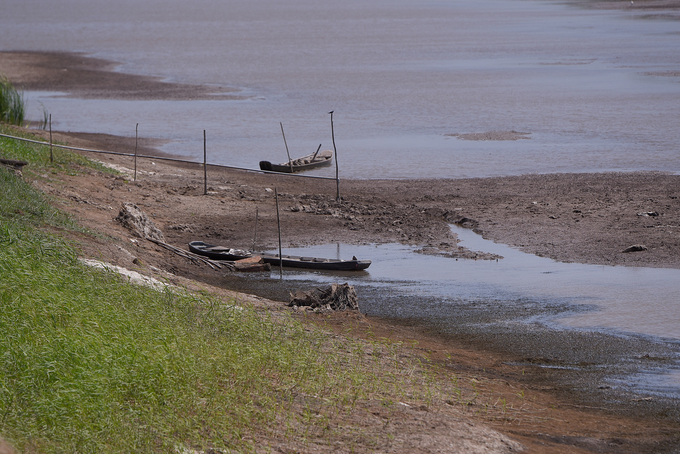November 27, 2025 | 16:08 GMT +7
November 27, 2025 | 16:08 GMT +7
Hotline: 0913.378.918
November 27, 2025 | 16:08 GMT +7
Hotline: 0913.378.918

Climate change is causing challenges to water source security. Photo: Tung Dinh.
Delegates Pham Thi Kieu from Dak Nong and Nguyen Thi Kim Be from Kien Giang raised concerns about the measures to guarantee water resources and maintain a stable living environment for the Vietnamese population in light of drought, resource scarcity, exhaustion, and salinity.
The primary concern lies in guaranteeing water security for household consumption, particularly in regions facing freshwater scarcity, inhabited by ethnic minorities, situated in mountainous areas, along borders, and on islands.
In response to Ms. Pham Thi Kieu's questions, Minister Dang Quoc Khanh of MONRE acknowledged that Vietnam is significantly affected by climate change, ranking among the six most susceptible nations to its consequences.
"Climate change has a significant impact on water resources, therefore it is essential to develop timely solutions to guarantee water security. Prioritizing water security necessitates the assurance of residential water sources. Hence, we must persist in safeguarding forests, engaging in afforestation efforts, and optimizing the utilization of water resources," stated the head of the natural resources and environment sector.
In response to delegate Nguyen Thi Kim Be's question, Minister Dang Quoc Khanh affirmed that climate change has a substantial influence on the erosion conditions in both the Mekong Delta region and the northern highland areas.
In order to address and reduce the previously described scenario, the Ministry of Natural Resources and Environment (MoNRE) is evaluating the quantities of sand and gravel in the riverbeds of the Mekong Delta region to get insight into the management of extraction reserves in different places.
Moreover, at now, all regions have implemented urban planning measures, necessitating a reevaluation and reorganization of people, particularly in areas susceptible to erosion that impact socio-economic factors. Regions with a high susceptibility to erosion need to restructure their inhabitants.
Furthermore, there is an imperative need for stringent laws and effective enforcement to prevent encroachment on riverbeds and riverbanks. Finally, it is necessary to improve the forecasting and warning capacities related to soil erosion.
Delegate Nguyen Thi Kim Be stressed the significance of proactive forecasting and preparedness to rapidly address climate-related changes during the discussion session. Consequently, she conveyed optimism that the Minister of Natural Resources and Environment would give due consideration to this matter.
Delegate Nguyen Thi Kim Be further emphasized that the excessive exploitation of groundwater in Vietnam exacerbates drought, depletion, and saltwater intrusion, in addition to the issues cited by the Minister. She suggested that the Ministry implement more effective management strategies to address the existing issue of groundwater extraction.
In response to delegate Nguyen Thi Kim Be, the Minister agreed with the stated concerns, highlighting the imperative to strengthen forecasting efforts. The Ministry has instructed its subordinate agencies to enhance their equipment and engage in partnerships with international organizations in order to enhance their forecasting capabilities, which are currently nearing worldwide benchmarks.
For example, the prediction of saltwater intrusion has been successfully implemented, delivering hydrological bulletins and frequent warning reports on a 10-day and monthly schedule, as well as periodically.
Mr. Dang Quoc Khanh stated that the Ministry of Natural Resources and Environment (MoNRE) will increase its investments in order to enhance early forecasting, early warning, and risk mitigation related to climate change.
Delegate Tran Thi Thu Phuoc (Kon Tum) expressed her belief that the drought situation in the upcoming years will continue to be intricate. She implored the Minister to elucidate resolutions for this matter.
The Minister acknowledged the substantial influence of climate change on diverse regions throughout the country. He emphasized the need to take proactive measures to address climate change, such as implementing the amended Water Resources Law and completing regional river planning. This includes rational water regulation and coordination, ensuring optimal water use, and providing forecasting and early warning systems to help localities shift their economic structure to combat drought.
Related to the water sector, that delegate raised on attracting investments to build water storage facilities, ensuring proactive water storage, regulation, and distribution to meet the demands for water use for daily life and socio-economic development.
Minister Dang Quoc Khanh stated that recently, there has been a strong focus on constructing reservoirs for water storage. The Ministry of Natural Resources and Environment is currently reviewing locations suitable for building reservoirs and water storage facilities. Water storage must be linked to efficient water usage.
Moreover, calling on businesses to construct reservoirs and dams must also be coupled with ensuring environmental protection efforts, avoiding any negative impacts on forests and ecosystems.
Translated by Linh Linh

(VAN) On the morning of November 27 in Beijing, Minister Tran Duc Thang and the Deputy Commissioner General of the General Administration of Customs of China signed a protocol on fresh jackfruit exports.

(VAN) As floodwaters recede, a vast network of irrigation works across eastern Gia Lai is emerging in a state of severe disrepair, with extensive damage demanding urgent restoration ahead of the 2025-2026 winter-spring cropping season.

(VAN) The conference reviewing three years of implementing Decision 911 identified the need to prioritize improving marine environmental quality and promoting sustainable fisheries development.

(VAN) Le Hoai Trung, Member of the Communist Party of Viet Nam Central Committee and Minister of Foreign Affairs, held talks with Vi Thao, Chairman of the Guangxi Zhuang Autonomous Region (China) this week.

(VAN) The Mekong River Commission adopts the 2026 - 2030 Strategic Plan with a people-centered approach.
/2025/11/26/1720-1-200855_132.jpg)
(VAN) Viet Nam and Japan have many conditions to expand cooperation on climate change adaptation, particularly in disaster risk management based on advanced technologies.

(VAN) The strong development of digital technology and artificial intelligence is opening up opportunities to transform science and technology into a 'Magic eye' for disaster forecasting and early warning.